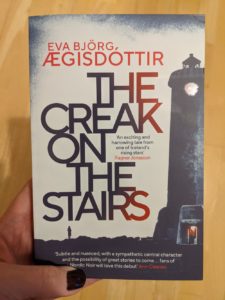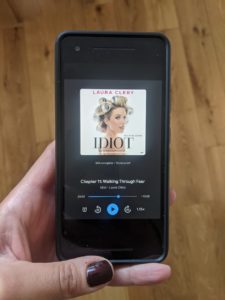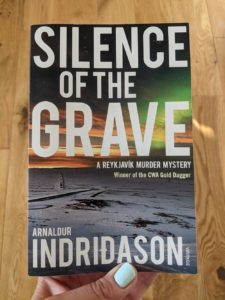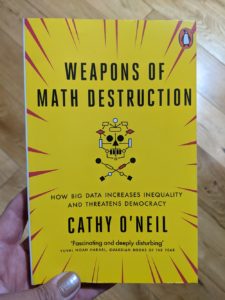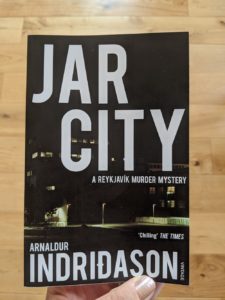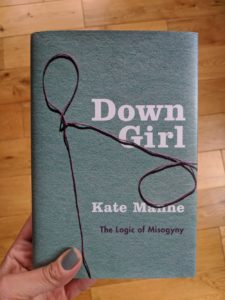 Four Stars
Four Stars
Best for:
Those looking for a deeper look into what misogyny really is.
In a nutshell:
Philosopher Kate Manne explores different definition of misogyny, providing support for her hypotheses with case studies many of us will be familiar with.
Worth quoting:
“Sexism [is] the branch of patriarchal ideology that justifies and rationalizes a patriarchal social order, and misogyny as the system that polices and enforces its governing norms an expectations. So sexism is scientific; misogyny is moralistic.”
Why I chose it:
I love philosophy and philosophical explorations of topics. I don’t love misogyny. Seemed like a good fit.
Review:
I’ve struggled with the difference between sexism and misogyny, and have usually used them interchangeably. I appreciate that with this book, Manne offers up definitions that can be supported with evidence. This is important to me because I think working from shared definitions helps to identify problems as well as work on solutions to them.
If I’ve understood her correctly (and I think I have), sexism is saying that once a woman has a child, it is her duty to stay home to raise the child, because that’s what women do. Misogyny is thinking ill of a woman who has a child but chooses to work outside the home, because she is not fulfilling her role as a woman. One is, as Manne says, ideological; the other is moral.
This definition is useful because misogyny is a thing, it’s a bad thing, and because folks recognize ‘misogyny’ as bad, they will bend themselves in all sorts of shapes to avoid accepting that they – or their actions – have any relation to it. In one of the chapters, Manne talks about how this can lead to a version of the ‘no true Scotsman’ fallacy, where the definition is so narrow as to not apply to anyone. “He has a wife! He loves her! He can’t be a misogynist!.”
Oh, but he can. And actually, she can as well! Because, as Manne argues, to engage in misogyny is to judge and punish women for not fulfilling their roles in our patriarchal society, for not giving what we deem women should give, and for attempting to take what we think men should have. So Mike Pence, say, can very much love his wife, and that love is not in spite of her being a woman. But he is still a misogynist when he judges and condemns women for seeking abortions (as they are not fulfilling their duty as mother / caregiver).
Manne often revisits the case of the Isla Vista guy who published a manifesto about how women were denying him his right to sexual gratification. He went on to kill many people, include men (though his original goal was to massacre a Sorority), before killing himself. In the aftermath, many people said he was ‘troubled’ and ‘mentally ill,’ but not a misogynist, because hey, he mostly killed dudes! But Manne argues throughout that the acts were motivated by misogyny, because the central issue for the Isla Vista killer was that women were giving other men attention that he deserved. The women were failing in their duty to provide him with romantic and sexual attention that was due him as a man. That is a misogynistic view of women.
Another side that Manne explores is the concept of the double standard, where women are judged harshly for being as successful as, or seeking the same roles as men. I tend to think of that as the ‘if she’s assertive, she’s a bitch but if he’s assertive he’s a leader’ idea. Women are not only judged for seeking positions of power outside the roles the patriarchy has decided fit us, but women are then judged for how we perform in those roles, whether that’s being held to an impossible standard or having outright lies made up about us and how we got where we are.
She also looks at how women can express misogynistic views, and spends a fair bit of time on this when looking at Hillary Clinton’s electoral college loss in 2016. So much of the revisiting of the election of 2016 made me angry, and a lot has been written about that time, but I think there are new things, interesting things, said here. Including how so much ink has been spent on what Clinton did wrong, but not nearly as much on what responsibility voters have for the decisions we made, and what role misogyny truly played in her not getting the US Presidency.
I also appreciate one little footnote that addresses the idea of misandry (which, hilariously, the software I’m using to write this review doesn’t recognize as a word). Given her premise that misogyny is based on a judgment of women for not fulfilling their roles as outlined in our patriarchal society, then misandry sort of … can’t exist. Because we don’t live in a matriarchy, so men can’t be judged based on not fulfilling those roles as set out by the matriarchy. Heh.
This book is generally accessible, but it does have a bit of a philosophy-paper vibe to it at times, which might not be familiar to some folks. There are a few phrases in there that I had to look up (clearly in the 10 years that have passed since I got my philosophy degree many things have faded from memory), but overall I think it’s a pretty easy read, given the topic.
Keep it / Pass to a Friend / Donate it / Toss it:
Keep it
